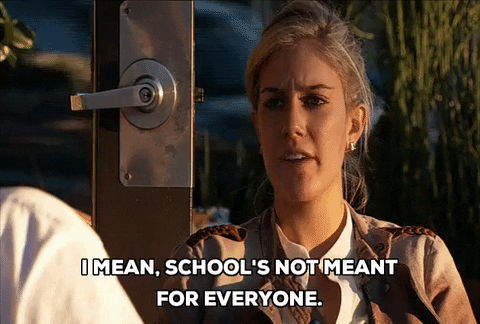Screenwriters are the backbone of the entertainment industry. There I said it. Without their creative genius, we wouldn’t have the forever iconic Godfather or endless stream of laughs being produced by Saturday Night Live. But how can someone get into the infamous writer’s room?
Let’s crack the code to becoming a screenwriter.
What the Hell does a Screenwriter do?

All that glitters is NOT gold in Hollywood. We knew this. The nitty-gritty, cutthroat attitude of the TV and film industries has been a notorious trope for decades. Why? Because the trope holds water. Maybe less nitty-gritty than assumed but highly competitive, nonetheless. So how can you, an amateur screenwriter, start your career strong?
First, you have to fully understand where you want to be. “A screenwriter writes for the screen — film or TV. Visual media. So, you’re thinking about action and behavior, primarily. You build a character through what they say and do. Because the famous mantra is ‘show, don’t tell,’” said screenwriter and creator of The Kings of Summer (2013) Chris Galletta. “Writing a novel or short story is different because [1] you can write out the character’s thoughts, and [2] the writing is an end unto itself. I’ve done that too — it’s different and very satisfying. But a film or television script is a blueprint, written to be shot. So, while putting a nice sentence together is a wonderful skill, it’s secondary to being able to tell a story, and getting the reader to watch the move in their head.” Think of screenwriting as traditional storytelling through a modern lens (pun intended).
College? Film School? Both? Neither?

The first step begins with education. The textbook starting point to screenwriting fame begins at college. Your best chances of gaining more insight into the field can be found in one of three collegiate programs: Film Studies, Television Production or English. Creative Writing can also be beneficial depending on what track your university has set for their students (definitely look into that before declaring).
Although earning your bachelor’s stands as an amazing achievement (and should be celebrated), you don’t necessarily need a degree to be a screenwriter. Unlike the path to becoming a doctor or teacher, which appear to be routine, successful screenwriting relies on the passion you bring to the table, not your education. One more time for the people in the back: Your success does not depend on your level of education.
Oscar-winning director and screenwriter Quentin Tarantino, didn’t go to film school. Hell, he didn’t even finish high school. Steven Spielberg, a man who created movies that transformed the film industry, was rejected from entering the University of California’s Film school.
However, deciding to continue your education relies heavily on your future plans. “Going to graduate school for your MFA is very helpful for some but it certainly isn’t required,” said Wagner College’s Film and Media Studies Program Co-Director Nelson Kim. “Grad school for filmmakers isn’t like getting a law degree or a medical degree, where you can’t practice without the credential.” If you want to eventually teach film, then you must look into graduate programs for the second degree needed to teach at a university. If you want to expand your network of future writing partners, film school offers you an opportunity to collab with fresh perspectives. But if you see yourself as an independent screenwriter, continuing your studies may not be necessary.
What You Need to Know

Now that we know school is for losers, let’s dive into the real s**t.
How Much Can I Expect to Make?
Unfortunately, screenwriters fall under the starving artist’s tax bracket (at first). Your income will not be consistent when you first start out. Freelancing or writing for free is the expected reality for amateur writers. But you won’t be counting pennies forever. Once you begin to build up both your network and portfolio, the money will start rolling in.
Not your Average Day in the Office
Being a screenwriter calls for isolating work in crazy environments. Writing can happen anywhere: conference room, coffee shop, hotel room, plane or at a toddler’s birthday party. Literally anywhere.
Writers Guild of America
The Writers Guild is the necessary “cover your ass” organization to protect the rights of writers and their million-dollar ideas. Most importantly, they set out the minimum amount of money a script is worth. Translation: a studio cannot pay you less than what the WGA sets as a minimum. So, no matter what, once an agreement is made, you can tell the studio to bring you your money.
Prepare Yourself

Expected skills to have prior to entering the production sector of the entertainment field would include your ability to set up a tripod, edit a clip, run the audio, etc. Qualities, however, cannot be taught in a classroom. Each come from experience and practice, practice, practice.
1. Pinpoint Your Perspective
Uncovering your unique view of the world sounds easy. I mean you’ve lived your entire life seeing the world through a lens so why should you invest more time into perfecting your personal perspective? Simple. The more time you spend training and learning how to apply your voice, the more prepared you are to write anything and everything. Still confused? Think of Picasso who is famous for his kaleidoscope-like portraits. He did not begin his artistic career dishing out abstract masterpieces. He began with sketches of people and scenes from everyday life. From there he was able to experiment with abstraction and color; later finding his own voice. Now, you must do the same.
2. Stay Disciplined
Screenwriting and consistency are never spoken in the same sentence. Therefore you have to avoid feeling discouraged when the job pool runs dry or the one script for a movie you spend eight months slaving over doesn’t get picked up by a studio. Keep writing. The most vital lesson you will learn in how to become a screenwriter is to invest in yourself. Practice your writing every day.
3. Network Goddamnit
You are your greatest asset as a screenwriter. Followed by the pool of fellow writers your hang out with. “Most jobs come about because of recommendations. A plumber fixing your sink is not available that day, but he knows a colleague who’s good. You’ll probably hire that colleague. The same kind of thing takes place in TV,” said co-head writer on Saturday Night Live Bryan Tucker. “A good writer or performer gets on a show, then recommends someone they’ve worked with in the past, and that person gets heavy consideration for the job.” You never know where you’ll end up but with a good network of friends you are sure to kick ass.
Let’s Hear from Our Experts

A how to guide would mean nothing without advice straight from the horse’s mouth so here’s what seasoned professionals have to say about the screenwriting industry.
“Talented people talk themselves out of this career all the time…I will say, you’d be amazed at what you can write in fifteen or thirty minutes a few days a week. And everyone hates writing [ideas] out because that’s the slog — that’s the busywork part. So, my advice would be to take the bad with the good,” Galletta said.
“One unfortunate thing you should know is, for most people, the beginning sucks. It involves a lot of people turning you down, doing work for free and being poor. Often, this lasts for years, and many people quit because doing something else becomes more appealing. The hardest part is making it through this initial struggle. The people who come out on the other side without changing careers usually stick around in some capacity,” Bryan Tucker said.
“First work on becoming a writer worth reading. It’s a lot harder to learn how to write a good screenplay than it is to learn how the film/TV business works — anyone can do that! Also, attend film festivals and panels near you, and talk to filmmakers. Look at tracking services like the Black List. Look into the many screenwriting labs, fellowships, and competitions out there — some are bogus, but a few of them are legitimate pathways to the industry (too many to list here, do your online research and you’ll find them easily!),” Kim said.



















